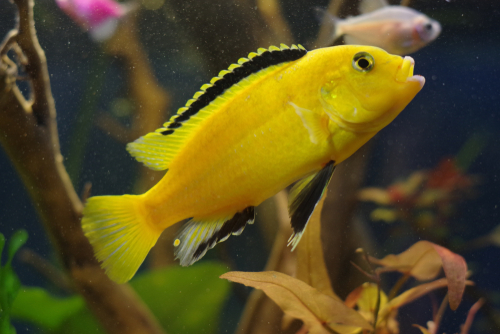The yellow lab cichlid, otherwise known as the electric yellow cichlid or the lemon drop cichlid, is a special fish! With that being said, if you were hoping to make your tank even more vibrant with some other fish, you’ll benefit from a list of the Best Yellow lab Cichlid tank companions!
The best fish to include as tank mates for the yellow lab cichlid are fish that are of a similar mellow temperament. Additionally, tank mates of the yellow cichlid should be able to survive in similar environmental temperatures and water hardness levels.
The yellow cichlid’s tank mates can be found in our list below, and we’ll make sure you know why these fish get along so well with your favorite sunny-colored pet!
Contents
Yellow Lab Cichlid Tank Mates – What You Need to Know
Most important things you need to know when having a different fish as a tank mate
Temperament
If your fish do not tend to get along with one another, it is probably due to temperament differences! As common as this is among people who are roommates, it is similarly important to take into account with your fish.
Yellow lab cichlids are not an overly aggressive fish. In fact, they can be described as downright peaceful! If you get other types of fish in the tank with a yellow cichlid who are more aggressive, you could wind up making a stressful environment for each aquatic pet.
Size
A yellow lab cichlid is usually about 4 to 6 inches in length, making it one of the smaller breeds of fish to keep. That being said, as long as you have fish which are similar in size or smaller than the yellow lab cichlid, you should be fine.
You can even test the boundaries and have fish that are slightly larger than the yellow lab cichlid, as long as their temperaments are peaceful.
Competition
Fish are not above stealing one another’s food sources, especially if they tend to eat the same kinds of food. Because of the yellow lab cichlid’s calm temperament, it may not be likely to compete heartily for food against aggressive fish.
Therefore make sure you grab tank mates that are either less competitive for the same sources of food that a yellow lab cichlid eats, or fish that prefer other types of food entirely!
On this subject, yellow lab cichlids typically eat tropical fish food, bloodworms, mysis, and other kinds of goldfish foods.
Parameters ; Tank Setup
With a tank that is too small, even the most peaceful fish, such as the yellow lab cichlid, are likely to begin fighting. In order to avoid this disruption of the peace, make sure your yellow lab cichlid has a tank that is at least 30 gallons large, if not more.
The Best Yellow Lab Cichlid Tank Mates
After careful research, we’ve brought together a list of the 12 best yellow lab cichlid tank mates you could ask for!
- Blue Dolphin Cichlids
- Rusty Cichlids
- Peacock Cichlids
- Yellow Tail Acei Cichlids
- Zebra Cichlids
- Red Fin Boreyli
- Featherfin Cichlid
- Red Tail Shark
- Jewel Cichlids
- Paratilapia
- Frontosas
- Kibrensis Cichlid
In the rest of this article, we’ll take a closer look at each of these fish species so you can determine what makes them compatible with the yellow lab cichlid!
More similar posts in this category:
- Electric Yellow Cichlid Tank Mates
- Golden Wonder Killifish Tank Mates
- Firemouth Cichlid Tank Mates
- Green Terror Tank Mates
1. Blue Dolphin Cichlids
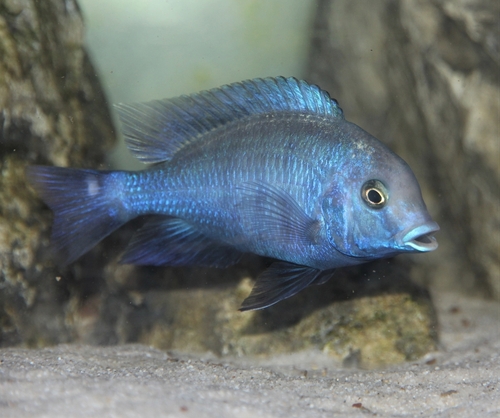
- Scientific Name: Cyrtocara Moorii
- Adult Size: 10 inches
- Compatible With: Yellow Lab Cichlids
- Water Temperature: 70 to 81 F
- Minimum Tank Size: 66 gallons
- Care Level: Easy
- Origin: Africa
The Blue Dolphin Cichlid, a native of African lakes, certainly makes a vibrant companion to the yellow lab cichlid, but most importantly, it is not likely to act too aggressively with your yellow lab cichlids.
While this is great news, it is important to also take note: Blue Dolphin Cichlids are not likely to compete with yellow labs because they prefer a carnivorous variety of food!
Pros of keeping with Yellow Lab Cichlid:
- Will not compete for the same foods.
Cons of keeping with Yellow Lab Cichlid :
- Can be aggressive in a tank that is too small!
2. Rusty Cichlids
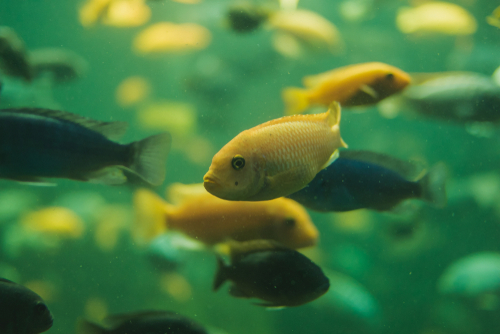
- Scientific Name: Idotropheus Sprengerae
- Adult Size: 3 to 4 inches
- Compatible With: Yellow Lab Cichlids
- Water Temperature: 77 to 84 F
- Minimum Tank Size:
- Care Level: Easy
- Origin: Africa
The rusty cichlid prefers a tank with plenty of cover in the forms of holes and caves. As long as this beautiful fish has somewhere to retreat to, it will be absolutely fine with your peaceful yellow lab cichlid!
Pros of keeping with Yellow Lab Cichlid:
- The peaceful temperament will keep the fish from fighting one another.
Cons of keeping with Yellow Lab Cichlid :
- None!
3. Peacock Cichlids
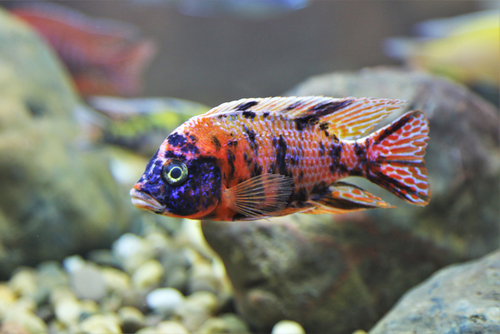
- Scientific Name: Auolonocara
- Adult Size: 4 inches
- Compatible With: Yellow Lab Cichlids
- Water Temperature: 74 to 82 F
- Minimum Tank Size: 55 to 60 gallons
- Care Level: Easy
- Origin: Africa
The peacock cichlid is not only absolutely lovely and exactly suited to the same tank conditions as a yellow lab cichlid, but it will typically feed on food that is at the bottom of the tank!
What this means is that your yellow lab cichlid won’t need to fear competition from peacock cichlids. Additionally, peacock cichlids have similarly peaceful temperaments to yellow lab cichlids!
Pros of keeping with Yellow Lab Cichlid:
- Similarities in size will keep the Peacock Cichlids from fighting yellow lab cichlids.
- Peacock cichlids eat in a different zone than yellow lab cichlids, meaning less food competition!
Cons of keeping with Yellow Lab Cichlid :
- None!
4. Yellow Tail Acei Cichlids
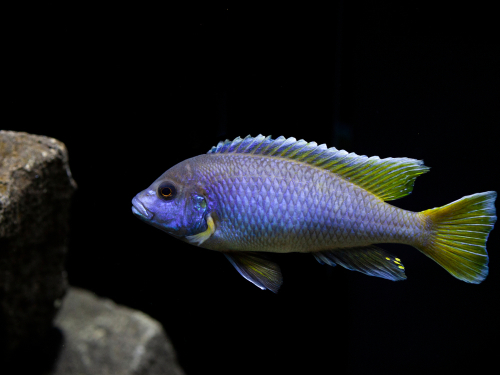
- Scientific Name: Pseudotropheus sp. “acei”
- Adult Size: 5 inches
- Compatible With: Yellow Lab Cichlids
- Water Temperature: 73 to 82 f
- Minimum Tank Size: 55 gallons
- Care Level: Easy
- Origin: Africa
Hailing from the same African lake as many of the fish on our list, the Yellow Tail acei makes a great addition to your tank! The yellow fins complement the yellow lab cichlid nicely. Additionally, they are just as mellow in temper as the yellow lab cichlid.
Pros of keeping with Yellow Lab Cichlid:
- Similarities in temperament mean no infighting.
Cons of keeping with Yellow Lab Cichlid :
- None!
5. Zebra Cichlids
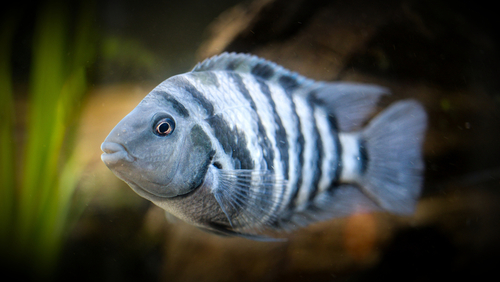
- Scientific Name: Maylandia estherae
- Adult Size: 6 inches
- Compatible With: Yellow Lab Cichlids
- Water Temperature: 72 to 82 F
- Minimum Tank Size: 50 gallons
- Care Level: Easy
- Origin: Africa
The beautiful zebra cichlid comes in an iridescent blend of colors that can help liven up your yellow lab cichlid tank. Though their diets are similar to a yellow lab cichlid, they tend to feed more on plants and algae, leading to very little conflict!
Pros of keeping with Yellow Lab Cichlid:
- Peaceful temperament means no infighting!
Cons of keeping with Yellow Lab Cichlid :
- This fish may take chunks out of any underwater plant life that isn’t sturdy!
6. Red Fin Boreyli
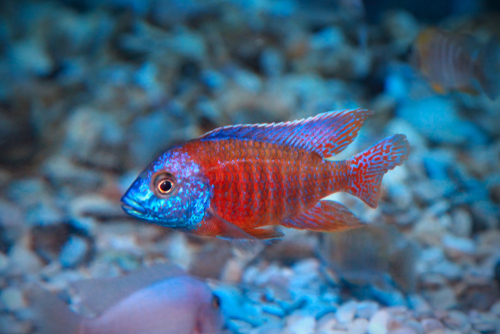
- Scientific Name: Copadichromis borleyi
- Adult Size: 8 inches
- Compatible With: Yellow Lab Cichlids
- Water Temperature: 78 to 82 F
- Minimum Tank Size: 90 Gallons
- Care Level: Easy
- Origin: Africa
The Red Fin Boreyli is a pleasing contrast to yellow lab cichlids, with it’s angular face shape and lovely orange to blue coloration. It is considered one of the more mild mannered cichlid species, so although it is larger than most yellow lab cichlids, it is not likely to cause trouble. This species is also not a picky eater, making it’s care level exceptionally easy!
Pros of keeping with Yellow Lab Cichlid:
- Mild mannered temperament means the red fin boreyli and yellow lab cichlids will not fight!
Cons of keeping with Yellow Lab Cichlid :
- Males may be aggressive during mating season!
7. Featherfin Cichlid
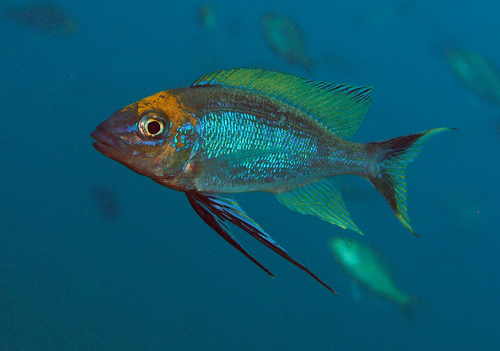
- Scientific Name: Cyathropharynx Furcifer
- Adult Size: 8 inches
- Compatible With: Yellow Lab Cichlids
- Water Temperature: 75 to 81 F
- Minimum Tank Size: 95 gallons
- Care Level: Easy
- Origin: Africa
The Featherfin Cichlid is named for its long, feather-shaped body and gracefully flowing dorsal and tail. Unlike some of the other fish on this list, the Featherfin cichlid is actually not similar to the yellow lab cichlid in terms of temper!
However, as long as the featherfin cichlid is the most dominant fish in the tank, it will actually be fairly compatible with the yellow lab cichlid.
Pros of keeping with Yellow Lab Cichlid:
- Featherfin’s dominant personality and yellow cichlid’s peaceful one actually balance each other out, so no fighting!
Cons of keeping with Yellow Lab Cichlid :
- Can become more aggressive if placed in too small a tank.
- Should be the most dominant fish in the tank.
8. Red Tail Shark
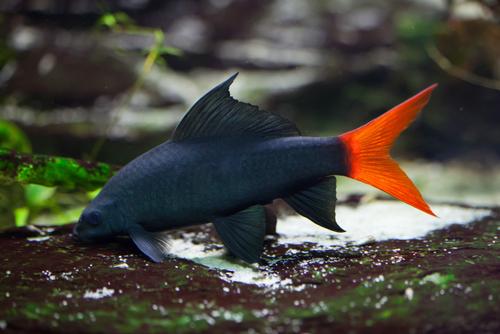
- Scientific Name: Epalzeorhynchos bicolor
- Adult Size: 6 inches
- Compatible With: Yellow Lab Cichlids
- Water Temperature: 72 to 79 F
- Minimum Tank Size: 55 gallons
- Care Level: Medium Difficulty
- Origin: Thailand
This species of carp is another option on our list that does not actually have a similar disposition to the yellow lab cichlid, but the partnership works anyway. This is because while the Red Tail Shark can be territorial, it only causes trouble for peaceful fish like the yellow lab if it does not have enough of its own space.
Give this fantastic-looking, larger fish enough room to stake a claim on a cave in the tank, and you should have no trouble between tank mates!
Pros of keeping with Yellow Lab Cichlid:
- Aggressive only toward fish that invade it’s space; compatible temperament with the peaceful yellow lab cichlid!
Cons of keeping with Yellow Lab Cichlid :
- Can become more aggressive if given inadequate space.
9. Jewel Cichlids
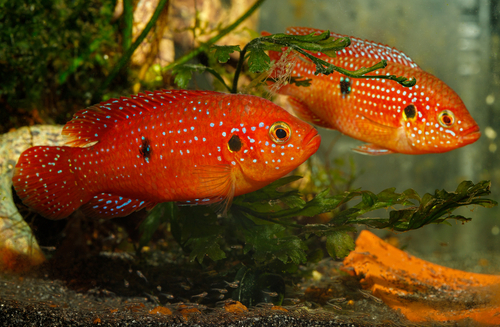
- Scientific Name: Hemichromis Bimaculatus
- Adult Size: 7 inches
- Compatible With: Yellow Lab Cichlids
- Water Temperature: 74 to 80 F
- Minimum Tank Size: 40 gallons
- Care Level: Medium difficulty.
- Origin: Africa
Jewel Cichlids are popular for their bright coloring. However, they can be slightly aggressive. Thankfully, the yellow lab cichlid is too large to be bullied consistently by the jewel cichlid, and as long as they are not the only two fish in the tank they should be fine! This leaves you to enjoy the energetic nature of the Jewel cichlid which matches it’s coloring!
Pros of keeping with Yellow Lab Cichlid:
- Can be kept from bullying yellow labs as long as there are more fish in the tank.
Cons of keeping with Yellow Lab Cichlid :
- Can be aggressive if left alone with an adolescent or smaller yellow lab cichlid.
10. Paratilapia
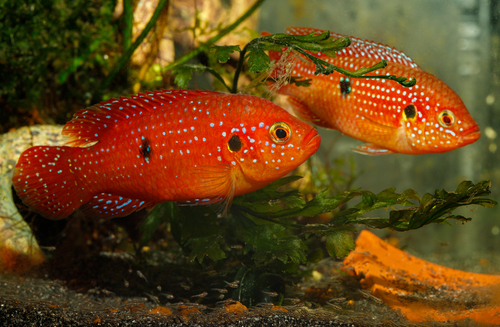
- Scientific Name: Paratilapia polleni
- Adult Size: 11 inches
- Compatible With: Yellow Lab Cichlids
- Water Temperature: 72 to 80 F
- Minimum Tank Size: 50 gallons
- Care Level: Easy
- Origin: Madagascar
The paratilapia is a type of cichlid, though it is large. It is beloved for it’s dark coloration and white spots, resembling the night sky! However, the paratilapia is highly aggressive and will even eat other fish that are smaller than itself.
This may make you worry about your smaller, mild-mannered yellow lab cichlid, but the good news is, the Paratilapia’s territorial nature can be avoided as long as it is given a large enough tank. This way, the paratilapia will not feel threatened or even interested in harming your yellow lab cichlid!
Pros of keeping with Yellow Lab Cichlid:
- May avoid yellow lab cichlid if the tank is big enough.
Cons of keeping with Yellow Lab Cichlid :
- May eat or injure smaller fish if kept in a tank that is too small.
11. Frontosas
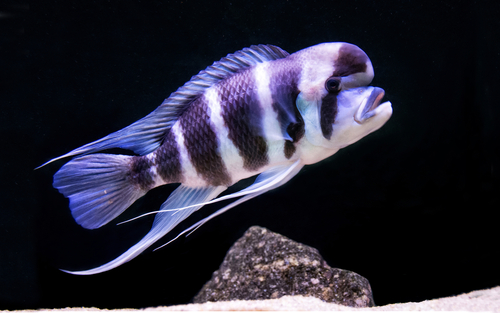
- Scientific Name: Cyphotilapia frontosa
- Adult Size: 8 to 10 inches
- Compatible With: Yellow Lab Cichlids
- Water Temperature:74 to 80 F
- Minimum Tank Size: 75 gallons
- Care Level: Easy
- Origin: Africa
With its prominent forehead, large lips, and striped body, the Frontosas is an attractive fish to add to your tank! It is also perfectly fine as a tank mate for yellow lab cichlids that are full grown. This is because although the frontosas is capable of aggression, it will usually leave peaceful fish that are above 3 inches long alone.
Pros of keeping with Yellow Lab Cichlid:
- Yellow lab cichlids that are adults are safe from frontosas’ aggression, in general!
Cons of keeping with Yellow Lab Cichlid :
- Fish smaller than inches may be eaten!
12. Kribensis Cichlid
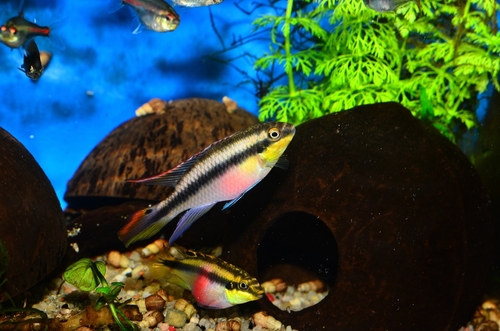
- Scientific Name: Pelvicachromis pulcher
- Adult Size: 5 inches
- Compatible With: Yellow Lab Cichlids
- Water Temperature: 75 to 81 F
- Minimum Tank Size: 44 gallons
- Care Level: Easy
- Origin: Africa
There are fewer cichlids more beautiful than the kribensis chichlid! With it’s elegant shape and iridescent coloring mixed with black, it is definitely eye-catching. It also makes an acceptable tank mate for the yellow lab cichlid! This is because its temperament is only aggressive during spawning time.
Pros of keeping with Yellow Lab Cichlid:
- Equally peacable temperament with yellow lab cichlids.
Cons of keeping with Yellow Lab Cichlid :
- None!
In Conclusion
In conclusion, the 12 best yellow lab cichlid tank mates are generally also in the cichlid family, or have their origins in Africa. For the most part, each of these fish have temperaments that are just as mild as the yellow lab cichlid’s calm manner.
Even those who are more aggressive, like the Red Tail Shark, occupy their own territory within the tank and can get along with yellow labs!

Ian Sterling, founder of Fishlab.com, began his aquarium journey over 30 years ago, driven by a deep fascination for fish and their diverse personalities. His website, Fishlab.com, is dedicated to making fishkeeping accessible and enjoyable, offering beginner-friendly guidance, expert insights, and a community for aquarists to connect and share experiences.


